Caryn
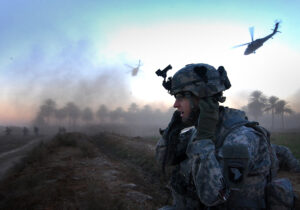 When the United States Army sends in the Army Special Forces, they are sending their very best people. It’s not that all of our soldiers aren’t the best in the world, because they are, but the Special Forces, also known as the “Green Berets” due to their distinctive service headgear, are a special operations force of the United States Army that are “designed to deploy and execute nine doctrinal missions: unconventional warfare, foreign internal defense, direct action, counter-insurgency, special reconnaissance, counter-terrorism, information operations, counterproliferation of weapons of mass destruction, and security force assistance. The first two missions, unconventional warfare and foreign internal defenses, emphasize language, cultural, and training skills in working with foreign troops. Other Special Forces missions, known as secondary missions, include: combat search and rescue (CSAR), counter-narcotics, hostage rescue, humanitarian assistance, humanitarian demining, information operations, peacekeeping, and manhunts.” Normally, the Special Forces teams are the ones sent in to rescue the other
When the United States Army sends in the Army Special Forces, they are sending their very best people. It’s not that all of our soldiers aren’t the best in the world, because they are, but the Special Forces, also known as the “Green Berets” due to their distinctive service headgear, are a special operations force of the United States Army that are “designed to deploy and execute nine doctrinal missions: unconventional warfare, foreign internal defense, direct action, counter-insurgency, special reconnaissance, counter-terrorism, information operations, counterproliferation of weapons of mass destruction, and security force assistance. The first two missions, unconventional warfare and foreign internal defenses, emphasize language, cultural, and training skills in working with foreign troops. Other Special Forces missions, known as secondary missions, include: combat search and rescue (CSAR), counter-narcotics, hostage rescue, humanitarian assistance, humanitarian demining, information operations, peacekeeping, and manhunts.” Normally, the Special Forces teams are the ones sent in to rescue the other 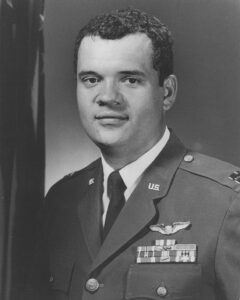 soldiers, or at least to drag them out of a sticky situation, but on this occasion, it was the Special Forces team that needed to be rescued.
soldiers, or at least to drag them out of a sticky situation, but on this occasion, it was the Special Forces team that needed to be rescued.
While returning to base from another mission, Air Force 1st Lieutenant James P Fleming and four other Bell UH-1F helicopter pilots received an urgent message from an Army Special Forces team. The pilots were told that the team was pinned down by enemy fire. Several of the other helicopter pilots had to leave the area because they were low on fuel, but Lieutenant Fleming and another pilot pressed on with the rescue effort. While the first attempt failed because of intense ground fire, they refused to abandon the Army green berets. Then, Fleming managed to land and pick up the team. Against all odds, he safely arrived at his base near Duc Co, at which time it was discovered that his helicopter was nearly out of fuel. For his lifesaving efforts, Lieutenant Fleming was later awarded the Medal of Honor for his actions. It was a selfless act, that could have cost him his life, but Lieutenant Fleming didn’t even consider his own life. He only thought about the others.
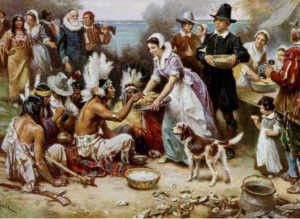 The past almost two years have been tough for everyone. Many of us have had to forgo this holiday or that holiday, because on or more family members have contracted Covid-19, and had to be quarantined. Nevertheless, more and more people are surviving Covid, and that is definitely something to be thankful for. In fact, as I contemplate Thanksgiving I find that I feel the need to look for things to be thankful for, rather than complaining about how hard things have been. That reminds me of the first Thanksgiving.
The past almost two years have been tough for everyone. Many of us have had to forgo this holiday or that holiday, because on or more family members have contracted Covid-19, and had to be quarantined. Nevertheless, more and more people are surviving Covid, and that is definitely something to be thankful for. In fact, as I contemplate Thanksgiving I find that I feel the need to look for things to be thankful for, rather than complaining about how hard things have been. That reminds me of the first Thanksgiving.
Most of us picture a big party were the new neighbors, the Pilgrims and the Wampanoag Indian Tribe, came together to celebrate newfound friendships, but that wasn’t it at all. Many in the Wampanoag tribe, as well as the entire Patuxet Tribe, had died of smallpox. To make matters worse, the Pilgrims were in danger of starving to death.  They really didn’t know much about farming, and between the smallpox, the winter cold, and lack of food, the Pilgrims were in a lot of trouble. With the help of the Wampanoag Tribe, the things they had to be thankful for, were many and they really were.
They really didn’t know much about farming, and between the smallpox, the winter cold, and lack of food, the Pilgrims were in a lot of trouble. With the help of the Wampanoag Tribe, the things they had to be thankful for, were many and they really were.
This past year reminds me quite a bit of the situation the Pilgrims and the Indians were in when they pulled together, helped each other, and in the end came through with much to celebrate and much to be thankful for. We have a long way to go, because much is broken right now, but the people of this nation are starting to fight for the the freedoms we have always known and loved, and we are thankful for every victory we see, and they are coming each day. Like the Pilgrims and the Indians, we have a long way to go, and many battles along the way, but we are a persevering people, and we will be great again. I am so thankful for all the people who are 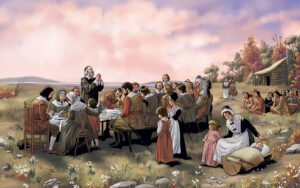 willing to step in and fight for this country, for life, liberty, and the pursuit of happiness. With people like this and above all, our awesome God leading the battle, we can’t lose.
willing to step in and fight for this country, for life, liberty, and the pursuit of happiness. With people like this and above all, our awesome God leading the battle, we can’t lose.
We have come through the times of illness, loss, and trial. Now we, as a nation, need to begin to pick ourselves up by our boot straps and prove to ourselves exactly what we are made of. I have no doubt in my mind that we can do this, and by Thanksgiving of 2022, we will be totally amazed at who we are, how far we have come, and we will have so many more things to be thankful for. Happy Thanksgiving everyone!! Have a great holiday!!
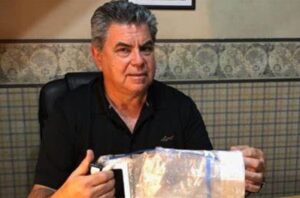 What can a car mechanic possibly have to do with the medical field? To me, they seem to be two very different fields, but when Jorge Odon came on the scene, all that changed. Jorge Odon is an Argentinian auto mechanic and inventor who created a device that has already been used hundreds of times, to assist in difficult births that could prove to be fatal for child and mother. It is appropriately named The Odon Device, and it is an “extremely simple tool that involves a plastic bag being inserted into the uterus and blown up with air, this then grips the baby’s head and allows it to be removed quickly and relatively painlessly.” The whole process seems like it could kill the baby, but in reality, it only looks dangerous.
What can a car mechanic possibly have to do with the medical field? To me, they seem to be two very different fields, but when Jorge Odon came on the scene, all that changed. Jorge Odon is an Argentinian auto mechanic and inventor who created a device that has already been used hundreds of times, to assist in difficult births that could prove to be fatal for child and mother. It is appropriately named The Odon Device, and it is an “extremely simple tool that involves a plastic bag being inserted into the uterus and blown up with air, this then grips the baby’s head and allows it to be removed quickly and relatively painlessly.” The whole process seems like it could kill the baby, but in reality, it only looks dangerous.
To ensure that the device does not damage the lining of the uterus, the bag only goes over the head of the baby so that the volume of material going into the uterus is limited. Meanwhile, there is little chance for the baby to be injured. Babies in the womb do not breath and therefore, the bag cannot suffocate them and it is far safer than other methods. Forceps and Ventouse devices (a vacuum extractor for use in assisting childbirth) can damage tissue and cause injuries to the skull of the infant. The idea for this lifesaving device first came to Odon in 2006 after seeing a video hack on how to remove a loose cork from an empty wine bottle. Seriously!! I find it totally amazing that someone can look at something like a cork in a bottle, and in their mind, see a 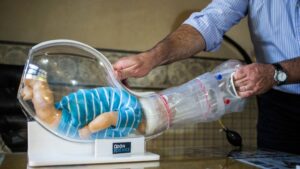 totally different, yet similar way to used the idea for the removal of the cork. The Odon Device is making a splash nevertheless. It has caught the attention of the world health organization (WHO) and global medical technology company, BD, which is currently developing the product. The device is incredibly inexpensive and easy to use, and so it is thought to be perfect for use in developing countries. It seems that in these In these types of countries, birth difficulties can often be fatal and so this tool has the potential to save an incredible amount of lives in the future. I think it is an incredible device for any country. Forceps have long been a dangerous device for babies, and the Ventouse Device sounds absolutely barbaric.
totally different, yet similar way to used the idea for the removal of the cork. The Odon Device is making a splash nevertheless. It has caught the attention of the world health organization (WHO) and global medical technology company, BD, which is currently developing the product. The device is incredibly inexpensive and easy to use, and so it is thought to be perfect for use in developing countries. It seems that in these In these types of countries, birth difficulties can often be fatal and so this tool has the potential to save an incredible amount of lives in the future. I think it is an incredible device for any country. Forceps have long been a dangerous device for babies, and the Ventouse Device sounds absolutely barbaric.
 During World War II, the Nazis had a little problem…the resistance. Of course, the resistance had to be very careful, and stay in hiding much of the time. There were informants, the police, and the enemy soldiers to watch out for. It was hard to tell sometimes who was an enemy and who was a friend. Every day was spent in hiding, and often in fear for their lives.
During World War II, the Nazis had a little problem…the resistance. Of course, the resistance had to be very careful, and stay in hiding much of the time. There were informants, the police, and the enemy soldiers to watch out for. It was hard to tell sometimes who was an enemy and who was a friend. Every day was spent in hiding, and often in fear for their lives.
With the Allied invasion of Normandy, the French resistance saw an opportunity to really increase their activity in the area. Of course, there were more fighter pilots in need of an escape routes, and soldiers who were wounded, but they also saw a way to strike back. One such way was to kidnap and kill Helmut Kampfe, a major in the Waffen-SS Das Reich. Of course, all resistance action came at a cost. Following the killing of Kampfe, a battalion of the regiment known 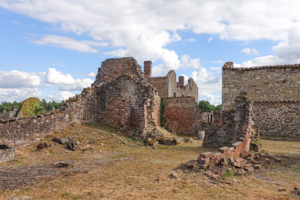 as Der Fuhrer Regiment was sent to the small village of Oradour-sur-Glane.
as Der Fuhrer Regiment was sent to the small village of Oradour-sur-Glane.
Of course, the village was innocent, but someone had to pay so Commander Adolf Diekmann ordered the town sealed off, the men locked in barns, and the women and children confined to the church. Nobody knows why the town was chosen for this attack. Maybe it was due to the town’s proximity to the regiment, or maybe it was because the Germans knew the village was defenseless. Whatever it was, it was about to get brutal.
Diekmann ordered his unit to begin shooting. It was like a terrorist attack. The residents were first incapacitated by gunshots to the legs. When they 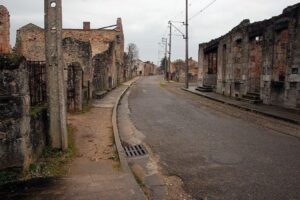 were unable to move, the barns and church were doused with gasoline and ignited. Hundreds of the villagers died that day, nearly all the residents of the area. Many of the SS who were there that day were Alsatian French nationals who had been forced into the German military, and almost all them escaped punishment, which is a crime in itself. After World War II, French president Charles De Gaulle declared that the village was never to be restored. It was to stand as it was after the attack, as a reminder of the brutal Nazi occupation. Brutality like that should never be forgotten, and maybe the evidence should stand as a reminder of the evil that exists in some people. Lest we forget.
were unable to move, the barns and church were doused with gasoline and ignited. Hundreds of the villagers died that day, nearly all the residents of the area. Many of the SS who were there that day were Alsatian French nationals who had been forced into the German military, and almost all them escaped punishment, which is a crime in itself. After World War II, French president Charles De Gaulle declared that the village was never to be restored. It was to stand as it was after the attack, as a reminder of the brutal Nazi occupation. Brutality like that should never be forgotten, and maybe the evidence should stand as a reminder of the evil that exists in some people. Lest we forget.

 My niece, Kelli Schulenberg is a country girl, through and through. She loves living in the country and would love to raise donkeys. Unfortunately, right now, she and my nephew Barry Schulenberg don’t have any donkeys, but I think it would be cool if they got some. I know that every little kid in the family would love to ride a donkey or even just feed them. Donkeys can be so sweet. Of course, they can also be stubborn. They are a bit like kids that way, I guess. It’s just par for the course.
My niece, Kelli Schulenberg is a country girl, through and through. She loves living in the country and would love to raise donkeys. Unfortunately, right now, she and my nephew Barry Schulenberg don’t have any donkeys, but I think it would be cool if they got some. I know that every little kid in the family would love to ride a donkey or even just feed them. Donkeys can be so sweet. Of course, they can also be stubborn. They are a bit like kids that way, I guess. It’s just par for the course.
Kelli loves country music, and attends as many concerts as she can each year. That said, I guess you know that she has seen lots of country music stars in her lifetime. I’m not sure who her favorite star is and maybe that’s because she has so many favorites that no single singer exactly stands out…at least not to me anyway.
Kelli has two “men” in her life. My nephew Barry, who she married on January 31, 2004, and their dog, Scout…who she calls Sheriff Scout, because he is always on duty and ready to pounce. Of course, about the only thing Scout will ever need to “pounce” on would be a rabbit who is brave (of foolish) enough to get to close, or enter the yard, in general. Scout rules the roost, and Kelli will confirm that story for sure. Scout has tons of toys, and “needs” them all out at the same time…apparently. Scout is a source of joy and laughter to Kellie and Barry.
Kelli loves the outdoors and especially hiking and bicycling, which go hand in hand with the fact that she loves Summer the best. In fact, if it weren’t for cross country skiing and snowshoeing, Kelli would have absolutely no 
 use for Winter at all…and as to the wonderful Wyoming wind…well, she’s definitely not a fan…but they, how many of us really are. Kelli loves the mountains and camping, which is no fun in the winter either, Spring, Summer, and Fall, with a heavy emphasis on Summer is right up her alley. Kelli and Barry go camping as much as they can in the Summer. They especially love camping in the Big Horns, but they also like Colorado for camping places. Kelli is an outdoor girl who loves lots of fun outdoor activities, and all things country. Today is Kelli’s birthday. Happy birthday Kelli!! Have a great day!! We love you!!
use for Winter at all…and as to the wonderful Wyoming wind…well, she’s definitely not a fan…but they, how many of us really are. Kelli loves the mountains and camping, which is no fun in the winter either, Spring, Summer, and Fall, with a heavy emphasis on Summer is right up her alley. Kelli and Barry go camping as much as they can in the Summer. They especially love camping in the Big Horns, but they also like Colorado for camping places. Kelli is an outdoor girl who loves lots of fun outdoor activities, and all things country. Today is Kelli’s birthday. Happy birthday Kelli!! Have a great day!! We love you!!
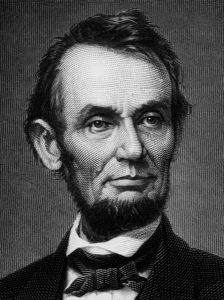 The hardest part about being a commander in any war situation is that moment when you have to tell a soldier’s family that they have been killed in action. It’s even easier to tell them that their soldier is missing, because at least then they have hope. The only thing that could possibly be harder than telling a soldiers family that they have been killed is to tell sibling soldiers’ family that they have been killed. That is the lot that fell to President Abraham Lincoln, according to legend, on November 21, 1864, except it came to him in spades. On that day, Lincoln composed a letter to Lydia Bixby, a widow and mother of five men, all of whom had been killed in the Civil War. It was a completely tragic state of affairs, and so made national news when a copy of the letter was published in the Boston Evening Transcript on November 25. It was signed by “Abraham Lincoln.” Oddly, the original letter has never been found, so it continues to be “legend” to this day.
The hardest part about being a commander in any war situation is that moment when you have to tell a soldier’s family that they have been killed in action. It’s even easier to tell them that their soldier is missing, because at least then they have hope. The only thing that could possibly be harder than telling a soldiers family that they have been killed is to tell sibling soldiers’ family that they have been killed. That is the lot that fell to President Abraham Lincoln, according to legend, on November 21, 1864, except it came to him in spades. On that day, Lincoln composed a letter to Lydia Bixby, a widow and mother of five men, all of whom had been killed in the Civil War. It was a completely tragic state of affairs, and so made national news when a copy of the letter was published in the Boston Evening Transcript on November 25. It was signed by “Abraham Lincoln.” Oddly, the original letter has never been found, so it continues to be “legend” to this day.
After expressing his condolences to Mrs Bixby on the death of her five sons, who had fought to preserve the Union in the Civil War, Lincoln goes on to express his regrets on how “weak and fruitless must be any words of mine which should attempt to beguile you from the grief of a loss so overwhelming.” He then continued with a prayer that “our Heavenly Father may assuage the anguish of your bereavement [and leave you] the cherished memory of the loved and lost, and the solemn pride that must be yours, to have laid so costly a sacrifice upon the altar of Freedom.”
Historians continue to debate the authorship of the letter, and the authenticity of copies printed between 1864 and 1891. Nevertheless, at that time, copies of presidential messages were often published and then sold as souvenirs. Many historians and archivists agree that the original letter was probably written by Lincoln’s secretary, John Hay. As to Mrs Bixby’s loss, scholars have since discovered that only two of her sons actually died fighting during the Civil War. A third was honorably discharged and a fourth was dishonorably thrown out of the Army. The fifth son’s fate is unknown, but it is assumed that he deserted or died in a Confederate prison camp. The facts in this case seem to show that sometimes Presidents are given misinformation, resulting in heartbreaking mistakes. If Mrs Bixby did receive this letter, it is my opinion that she quite likely fainted on the 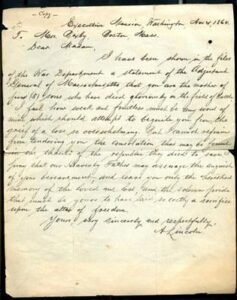 spot, and then to find out later that the president had been given wrong information that caused him, gentle man that he was, to feel the need to write this particular letter himself, rather than letting the commanding officer be the bearer of such bad news.
spot, and then to find out later that the president had been given wrong information that caused him, gentle man that he was, to feel the need to write this particular letter himself, rather than letting the commanding officer be the bearer of such bad news.
I’m sure that upon finding that there had been an error, President Lincoln was appropriately appalled, but at that point there was not much to do about it. The letter had been sent, and to bring up the additional facts, especially the son that was thrown out of the army, would have only made matters worse. In addition, they did not know where the missing son was, and possibly didn’t know for sure where the others were either, so it made sense to leave well enough alone. Still, I’m sure their mother would like to have known where her sons really were. While this situation was possibly, or at least partially, an awful mistake, it is still the hardest part of the job of commander, and one that is usually felt very deeply by those who have had to write such a letter.
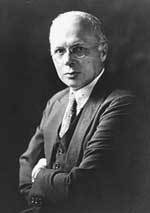 Modern medicine has come a long way through the advances of a number of people, one of the greatest being Richard Lewisohn. Born July 12, 1875, in Hamburg, Germany, Lewisohn studied medicine at the University of Freiburg, which is still one of the most prestigious medical schools in Europe. He obtained his medical degree in 1899, and in 1906, he immigrated to New York. Lewisohn’s initial interest was in the digestive system (gastroenterology). He began his work at Mount Sinai Hospital, but, it ended up being his work with blood transfusions that made him the medical hero he was.
Modern medicine has come a long way through the advances of a number of people, one of the greatest being Richard Lewisohn. Born July 12, 1875, in Hamburg, Germany, Lewisohn studied medicine at the University of Freiburg, which is still one of the most prestigious medical schools in Europe. He obtained his medical degree in 1899, and in 1906, he immigrated to New York. Lewisohn’s initial interest was in the digestive system (gastroenterology). He began his work at Mount Sinai Hospital, but, it ended up being his work with blood transfusions that made him the medical hero he was.
The blood is a complicated matter, and the study of the blood, or rather the experimentational use of the blood, often ended with tragic, and even fatal results. Of course, much of the problem came from having no understanding, or even any knowledge of blood types. The discovery of blood types didn’t come about until 1901, when Karl Landsteiner discovered that blood consisted of different types. Some types were compatible and could be transfused, leading to healing, but other types coagulated when mixed and would kill you. It was an amazing discovery, but Landsteiner’s discovery did not change medicine overnight. Doctors still faced the the fact that when blood was removed to transfuse into another person, it quickly clotted, making it unusable. That led to a direct method of transfusion, crazy in and of itself, in which doctors would sew the veins and arteries of the donor and the recipient together. Maybe it worked, but it just wasn’t practical. Not only did you have to have a donor with the correct type on hand, but the physician didn’t know how much blood was being pumped into the patient, or out  of the donor, for that matter. They needed a way to have blood on hand, and in measurable containers, all without having to deal with spoilage.
of the donor, for that matter. They needed a way to have blood on hand, and in measurable containers, all without having to deal with spoilage.
In April 1914, a Belgian physician named Albert Hustin, proved that sodium citrate could be used as an anticoagulant in diluted blood. Lewisohn immediately jumped upon this insight and set up detailed experiments using sodium citrate and dog blood. Through Lewisohn’s experiments transfusing dogs, he was able to determine the exact concentration of sodium citrate that was both safe and effective for blood transfusions. He was also able to keep the extracted blood viable for two days prior to transfusion. More study would eventually increase that timeframe up to 14 days.
This was exactly what the world needed…blood could be stored, and made available as needed. Lewisohn’s work led to the storage of blood in blood banks. It is a discovery that is credited with saving over 1 billion lives to date. Lewisohn’s discovery, occurring at the time of World War I, as well as his findings concerning blood storage for transfusions was used as a method to save the lives of wounded soldiers. Use of blood transfusions 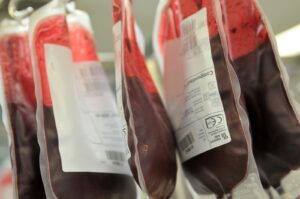 expanded after the war. By the 1930s Blood Banks became common in cities worldwide, making blood transfusions the most important lifesaving medical advance in history.
expanded after the war. By the 1930s Blood Banks became common in cities worldwide, making blood transfusions the most important lifesaving medical advance in history.
In 1955 Lewisohn received the American Association of Blood Banks’ Karl Landsteiner Memorial Award. In January 1959 he became an honorary fellow of the Royal College of Surgeons of England, having been a fellow of the American College of Surgeons since 1916. Lewisohn was also a Fellow of the American Gastroenterological Association, and served on the American Board of Surgery. He passed away (probably of natural causes, but I cannot confirm that) on August 11, 1961 in New York City. He was 86 years old.
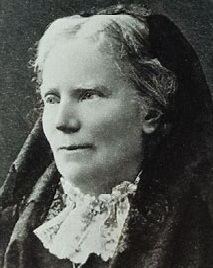 In the mid-1800s, it was unheard of for a woman to be a doctor. They were barely allowed to be a nurse, although they were somehow expected to be able to do all the “nursing” duties for their own family. Elizabeth Blackwell was born February 3, 1821 and she was about to change things forever. She first became a physician in England, and then she became the first woman to receive a medical degree in the United States, and the first woman on the Medical Register of the General Medical Council. I’m not a big “women’s libber,” but sometimes women need to decide what they want to do in life, and go for it. Elizabeth Blackwell played an important role in both the United States and the United Kingdom as a social awareness and moral reformer. She promoted education for women in medicine.
In the mid-1800s, it was unheard of for a woman to be a doctor. They were barely allowed to be a nurse, although they were somehow expected to be able to do all the “nursing” duties for their own family. Elizabeth Blackwell was born February 3, 1821 and she was about to change things forever. She first became a physician in England, and then she became the first woman to receive a medical degree in the United States, and the first woman on the Medical Register of the General Medical Council. I’m not a big “women’s libber,” but sometimes women need to decide what they want to do in life, and go for it. Elizabeth Blackwell played an important role in both the United States and the United Kingdom as a social awareness and moral reformer. She promoted education for women in medicine.
Strangely, Blackwell was not interested in a career in medicine at first. In fact, when her schoolteacher brought in a bull’s eye to use as a teaching tool, Blackwell found that she didn’t feel so well. So, initially, she became a schoolteacher in order to support her family. Teaching school was one of the few “acceptable” occupations for women during the 1800s. Unfortunately for her, she hates every minute of teaching, but she found that medicine and medical subjects did interest her.
Her interest in medicine began after a friend fell ill and told her that, if a female doctor had cared for her, she 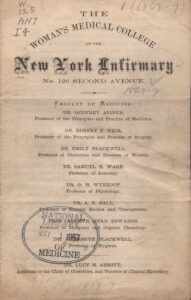 might not have suffered so much. Blackwell decided then and there that she would go to medical school. She began applying to medical schools and immediately found out that there was a prejudice against women students of medicine. In fact, there was no such thing, and the school and other students intended to keep it that way. That prejudice against her gender would persist throughout her career, but it did not stop her.
might not have suffered so much. Blackwell decided then and there that she would go to medical school. She began applying to medical schools and immediately found out that there was a prejudice against women students of medicine. In fact, there was no such thing, and the school and other students intended to keep it that way. That prejudice against her gender would persist throughout her career, but it did not stop her.
She was rejected from every medical school she applied to, except Geneva Medical College, currently known as State University of New York Upstate Medical University. Amazingly, her acceptance came after the male students voted for her acceptance. And so it was that in 1847, Elizabeth Blackwell became the first woman to attend medical school in the United States. Her inaugural thesis on typhoid fever was published in 1849 in the Buffalo Medical Journal, shortly after she graduated. It was the first medical article ever published that had been written by a woman female student from the United States. In what was considered a perspective that was deemed by the medical community as feminine, the thesis “portrayed a strong sense of empathy and sensitivity to human suffering, as well as strong advocacy for economic and social justice.”
In 1857, Elizabeth Blackwell founded the New York Infirmary for Women and Children with her sister Emily Blackwell, and began giving lectures to female audiences on the importance of educating girls. She also played a significant role during the American Civil War by organizing nurses. Her contributions remain celebrated with the Elizabeth Blackwell Medal, which is awarded annually to a woman who has made significant contribution to 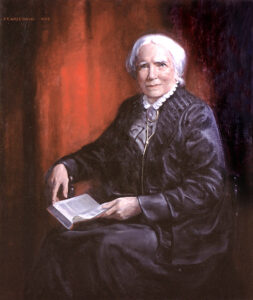 the promotion of women in medicine. Blackwell remained active even into her later years. In 1895, she published her autobiography, Pioneer Work in Opening the Medical Profession to Women. It was not very successful, selling less than 500 copies. After this publication, Blackwell slowly relinquished her public reform presence, and spent more time traveling. She visited the United States in 1906 and took her first and last car ride.
the promotion of women in medicine. Blackwell remained active even into her later years. In 1895, she published her autobiography, Pioneer Work in Opening the Medical Profession to Women. It was not very successful, selling less than 500 copies. After this publication, Blackwell slowly relinquished her public reform presence, and spent more time traveling. She visited the United States in 1906 and took her first and last car ride.
While holidaying in Kilmun, Scotland in 1907, Blackwell fell down a flight of stairs, and was left almost completely mentally and physically disabled. On May 31, 1910, she died at her home in Hastings, Sussex, after suffering a stroke that paralyzed half her body. Her ashes were buried in the graveyard of Saint Munn’s Parish Church, Kilmun, and obituaries honoring her appeared in publications such as The Lancet and The British Medical Journal.
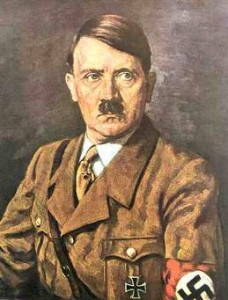 When Hitler began his reign of terror, he fully expected that he would meet with little resistance from the people he was attempting to control, but that really never turned out to be the case. Even some of those who aligned themselves with him at first, rebelled later. Hitler found that out when, on November 18, 1940, he met with Italian Foreign Minister Galeazzo Ciano over Mussolini’s disastrous invasion of Greece.
When Hitler began his reign of terror, he fully expected that he would meet with little resistance from the people he was attempting to control, but that really never turned out to be the case. Even some of those who aligned themselves with him at first, rebelled later. Hitler found that out when, on November 18, 1940, he met with Italian Foreign Minister Galeazzo Ciano over Mussolini’s disastrous invasion of Greece.
Mussolini had led Hitler to believe that he had no intention of attempting to invade Greece. Then, he surprised everyone with a attempted invasion of Greece. Even his ally…Hitler, was caught off guard, since Mussolini had led Hitler to believe he had no such intention. Even Mussolini’s own chief of army staff only found out about the invasion after the fact!!
Mussolini was warned against trying to invade Greece. Everyone around him knew that the Greek people were determined to hold onto their freedom, and that the Italian Army was woefully unprepared for such an attack. Even his own generals warned of a lack of preparedness on the part of his military. Nevertheless, and despite the fact that it would mean getting bogged down in a mountainous country during the rainy season against an army willing to fight tooth and nail to defend its autonomy, Mussolini moved ahead mostly out of sheer arrogance, convinced he could defeat the “inferior Greeks” in a matter of days. He also knew a secret, that millions of Lire (The primary unit of currency in Italy, Malta, San Marino, and the Vatican City before the adoption of the Euro) had been put aside to bribe Greek politicians and generals not to resist the Italian invasion. The whole bribe idea didn’t work out too well, however. Whether the money ever made it past the Italian fascist agents delegated with the responsibility is unclear, but if it did, it clearly made no difference. The Greeks pushed the Italian invaders back into Albania after just one week. The whole operation was a miserable failure, and the Italians spent the next three months fighting for life in a fierce, defensive battle. To make matters worse, about half the Italian fleet had been crippled by a British carrier-based attack at Taranto.
A furious Hitler severely criticized Ciano at their meeting in Obersalzberg, for opening an opportunity for the British to enter Greece and establish an airbase in Athens. That put the Brits within striking distance of valuable 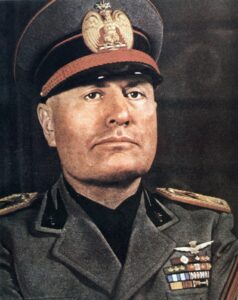 oil reserves in Romania that Hitler needed for his war machine. Hitler now had to divert forces from North Africa, a high strategic priority, to Greece in order to bail Mussolini out. He actually considered leaving the Italians to fight their own way out of the mess, and considered making peace with the Greeks as a way of forestalling an Allied intervention. Nevertheless, Germany would have to invade, in April 1941, thereby adding Greece to its list of conquests…whether Hitler wanted to or not. That put the Brits within striking distance of valuable oil reserves in Romania that Hitler needed for his war machine. Hitler now had to divert forces from North Africa, a high strategic priority, to Greece in order to bail Mussolini out. He actually considered leaving the Italians to fight their own way out of the mess, and considered making peace with the Greeks as a way of forestalling an Allied intervention. Nevertheless, Germany would have to invade, in April 1941, thereby adding Greece to its list of conquests…whether Hitler wanted to or not.
oil reserves in Romania that Hitler needed for his war machine. Hitler now had to divert forces from North Africa, a high strategic priority, to Greece in order to bail Mussolini out. He actually considered leaving the Italians to fight their own way out of the mess, and considered making peace with the Greeks as a way of forestalling an Allied intervention. Nevertheless, Germany would have to invade, in April 1941, thereby adding Greece to its list of conquests…whether Hitler wanted to or not. That put the Brits within striking distance of valuable oil reserves in Romania that Hitler needed for his war machine. Hitler now had to divert forces from North Africa, a high strategic priority, to Greece in order to bail Mussolini out. He actually considered leaving the Italians to fight their own way out of the mess, and considered making peace with the Greeks as a way of forestalling an Allied intervention. Nevertheless, Germany would have to invade, in April 1941, thereby adding Greece to its list of conquests…whether Hitler wanted to or not.


